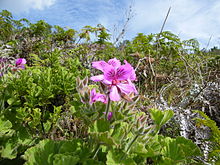Pelargonium cucullatum
| Pelargonium cucullatum | |
|---|---|
 |
|
| Scientific classification | |
| Kingdom: | Plantae |
| (unranked): | Angiosperms |
| (unranked): | Eudicots |
| (unranked): | Rosids |
| Order: | Geraniales |
| Family: | Geraniaceae |
| Genus: | Pelargonium |
| Species: | P. cucullatum |
| Subspecies: | tabulare |
| Binomial name | |
|
Pelargonium cucullatum (L) L'Hér |
|
Pelargonium cucullatum (also called wildemalva, tree pelargonium or hooded-leaf pelargonium) is a species of plant in the Geraniaceae family, that is indigenous to the south-western Cape of South Africa. It produces masses of pink and purple flowers in the summer and has been used to produce a great number of modern Pelargonium hybrids.
This vigorous, fast-growing shrub can reach heights of over a meter. The leaves grow upwards, forming circular bowls with jagged, red-tipped edges. The sweetly scented flowers are purple or pink and appear for several months over the summer. During this time, the wild plants stand out in the indigenous fynbos in places like Table Mountain.
There are three subspecies, Pelargonium cucullatum subsp. cucullatum, Pelargonium cucullatum subsp. strigifolium and Pelargonium cucullatum subsp. tabulare
Subspecies tabulare is found in the Cape Peninsula.
Pelargonium cucullatum is becoming increasingly popular as a garden plant, especially in the Western Cape, South Africa. It prefers a sunny position and once established is very tough and waterwise. It can be propagated by cuttings and by seed. Like many geraniums, this plant's leaves give off a pleasant herbal scent when crushed and they have a wide variety of uses in traditional medicine.
...
Wikipedia
